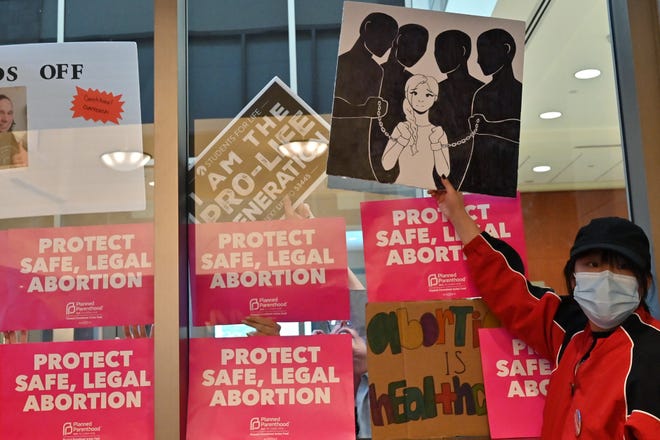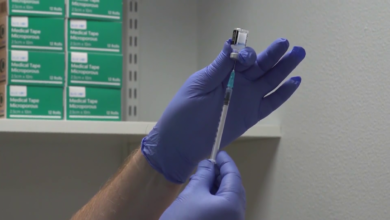

For years, Ohio's fight over abortion access has been waged in a predictable pattern.
The state's GOP-controlled Legislature and Republican governor would enact an abortion restriction – everything from reducing the number of weeks the procedure is legal to adding hurdles for doctors who perform them. Then, abortion providers or their allies would sue and a federal judge would block the law before it takes effect.
But a Mississippi case before the U.S. Supreme Court threatens to break that loop. The court's new conservative majority could overturn the landmark abortion decision Roe v. Wade, forcing states to decide when abortion is legal.
More:'A very serious moment': Abortion case headed to U.S. Supreme Court could reverberate in Ohio
Abortion opponents want to be prepared for that moment.
Enter Senate Bill 123, which would ban abortions in Ohio if the U.S. Supreme Court reversed its opinion on Roe v. Wade. Often called a "trigger law," this language is already on the books in 11 states.
Under the proposed law, which has its first hearing Wednesday, doctors who perform abortions would face a fourth-degree felony. If they are arrested or sued, physicians could avoid penalties if they could prove they performed the abortion to save the patient's life.
The bill includes other penalties for those who "promote abortion" by selling or advertising medication.
More:New Ohio bill would ban abortion if Supreme Court empowers states to decide
This isn't the first time Ohio lawmakers have attempted to pass a contingency plan for Roe's demise, but trigger law proposals took a back seat to other abortion restrictions. The urgency wasn't there when the top court was divided.
"As the court has evolved with Trump's presidency, triggers become an absolute priority," Ohio Right to Life President Mike Gonidakis said. "This is our No. 1 matter to get through this year."
After all, the landmark abortion decision has never been on shakier ground. The top court's decision to review the Mississippi case and not to block Texas' six-week abortion ban are seen as harbingers of what's to come.
"They sent a clear signal that they may be looking to overturn or gut the (Roe v. Wade) decision," said Kellie Copeland, executive director of NARAL Pro-Choice Ohio. "The impact on individuals would be devastating."
The U.S. Supreme Court's big test
In May, the U.S. Supreme Court agreed to hear Dobbs v. Jackson Women's Health Organization, a case challenging a Mississippi law that bans most abortions after 15 weeks gestation.
More:Supreme Court to consider Mississippi 15-week abortion ban with new conservative majority
The move came less than a year after a divided U.S. Supreme Court struck down a Louisiana law that required doctors who performed abortions to have admitting privileges in nearby hospitals. Chief Justice John Roberts, appointed by Republican President George W. Bush, sided with the four liberal justices.
Three months after that decision, Justice Ruth Bader Ginsburg died. To fill that seat, President Donald Trump nominated Justice Amy Coney Barrett, who once signed a letter calling for "an end to the barbaric legacy of Roe v. Wade."
Conservatives are eager to test their new Supreme Court majority on their longstanding nemesis: Roe v. Wade. Oral arguments on the Mississippi case are slated for Dec. 1 and a decision will come in June.
"This is the closest we’ve been in my lifetime," Gonidakis said. "Roe v. Wade hangs by a thread. Ohio must be prepared for what comes next."
More:Republican attorneys general, including Ohio's Dave Yost, urge overturning Roe v. Wade
For decades, abortion restrictions have been measured against the standards of Roe and another case, Planned Parenthood v. Casey. Does the law place an undue burden on those seeking abortions?
For laws like Ohio's heartbeat bill, which banned abortions as early as six weeks gestation, the answer has been "yes." But if the standard shifts, abortion laws in Ohio could look dramatically different.
What would happen if Roe fell?
If Roe v. Wade were overturned today, state lawmakers across America would be tasked with defining when and where abortion would be legal in their states. Given the GOP-controlled Ohio Legislature's track record with abortion limits and restrictions, an outright ban seems likely.
If passed, Senate Bill 123 would remove that ambiguity; performing an abortion would be a crime in Ohio.
Texas offers a window into what that patchwork of laws could look like, Copeland said. Patients with money or contacts in neighboring states are leaving to have abortions.
“What happens to the people who don’t have those things?” she asked.
The U.S. House of Representatives recently passed a bill to codify Roe v. Wade and expand abortion access. The proposal passed largely along party lines, but its future is murky in the divided U.S. Senate.
“That could be one way to protect people from the devastating impact of what the Supreme Court could decide to do," Copeland said. But she warned against counting on Congress to save access to abortions. "We know this is going to be a state by state fight and we’re prepared for that."
USA TODAY reporting contributed to this article.
Jessie Balmert is a reporter for the USA TODAY Network Ohio Bureau, which serves the Akron Beacon Journal, Cincinnati Enquirer, Columbus Dispatch and 18 other affiliated news organizations across Ohio.
Source link









